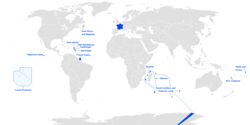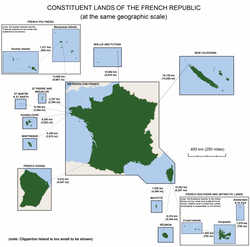French Overseas Departments and Territories
|
Overseas France
|
|
|---|---|

|
|
 |
|
 |
|
| Largest settlements | Nouméa, New Caledonia Papeete, French Polynesia |
| Languages | French, Antillean Creole, Guianese Creole, Reunionese Creole, Shimaore, Tahitian, Marquesan, 'Uvean, Futunan, Drehu, Nengone, Paicî, Ajië, Xârâcùù, and 35 other native languages of New Caledonia |
| Demonym | French |
| Territories | |
| Leaders | |
| François Hollande | |
|
• Ministry
|
George Pau-Langevin |
| Area | |
|
• Total
|
551,394 km2 (212,894 sq mi) |
| Population | |
|
• Estimate
|
2,718,000 (2016) |
| Currency |
Euro CFP Franc |
| Date format | dd/mm/yyyy (AD) |
|
This article is part of the series on
Administrative divisions of France |
|
(incl. overseas regions) |
|
(incl. overseas departments) |
|
Urban communities |
|
Others in Overseas France
Overseas collectivities |
The Overseas France (French: France d'outre-mer) consist of all the French-administered territories outside of the European continent. These territories have varying legal status and different levels of autonomy, although all (except those with no permanent inhabitants) have representation in both France's National Assembly and Senate, which together make up the French Parliament. Their citizens have French nationality and vote for the president of France. They have the right to vote in elections to the European Parliament (French citizens living overseas currently vote in the Overseas constituency). The Overseas France include island territories in the Atlantic, Pacific and Indian oceans, French Guiana on the South American continent, and several Periantarctic Islands as well as a claim in Antarctica.
From a legal and administrative standpoint, overseas regions are very different from overseas collectivities. Overseas regions have exactly the same status as mainland France's regions. The French constitution provides that, in general, French laws and regulations (France's civil code, penal code, administrative law, social laws, tax laws, etc.) apply to French overseas regions the same as in mainland France, but can be adapted as needed to suit the region's particular needs. In the French overseas regions, laws cannot be adapted whereas the overseas collectivities are empowered to make their own laws, except in certain areas (such as defense, international relations, trade and currency, and judicial and administrative law). The overseas collectivities are governed by local elected assemblies and by the French Parliament and French government (where a cabinet member, the Minister of Overseas France, is in charge of issues related to the overseas territories).
...
Wikipedia
